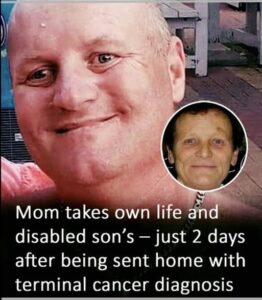The Heartbreaking Story of Shirley Nunn: A Mother’s Love and a System’s Failure

In 2021, a quiet home in Middlesborough, England, became the scene of a devastating tragedy that shook an entire community. Sixty-seven-year-old Shirley Nunn and her 50-year-old son Steven were found dead together — a heartbreaking end to a story marked by love, struggle, and missed opportunities for help.
A Mother’s Lifelong Devotion
For nearly four decades, Shirley’s world revolved around caring for her son. When Steven was just 11 years old, he suffered a life-changing accident that left him in a coma and caused severe brain damage. Despite surviving through multiple surgeries, the injuries left him with cerebral palsy, epilepsy, and lasting cognitive and mobility challenges.
Since then, Shirley had dedicated her life to being his full-time caregiver. When her husband passed away from cancer, she became Steven’s only support, working with adult social care services that had been involved since 2005. But even with some outside help, the emotional and physical toll of caregiving was immense.
A Terminal Diagnosis
In 2021, Shirley received devastating news: she had stage three lung cancer. Within months, the disease spread to her brain, spine, and pelvis, leaving her with little time left. Even as her own body grew weaker, she continued to care for Steven, determined to remain by his side.
Arrangements were made for Shirley to spend her final days at home — but behind her determination, she was silently falling apart. A Domestic Homicide Review later revealed that Shirley had shown clear signs of depression and despair, including thoughts of ending her life.
“She broke down in tears twice, reflecting on how her condition was worsening,” the report stated.
Despite her vulnerability, no urgent mental health support plan was ever put in place.
A Preventable Tragedy
In October 2021, Shirley was admitted to hospital again due to complications from her illness. Just two days after being discharged, her sister contacted police — and both Shirley and Steven were found dead inside their home. The date was especially poignant: exactly two years to the day since her husband’s passing from cancer.
The official investigation concluded that critical chances to help Shirley had been missed. While professionals recognized her physical decline, they underestimated the psychological distress she was in.
“The severity of her cancer should have prompted immediate attention to her mental health and care situation,” the report found. “That urgency was not fully understood by professionals.”
“[Ms. Nunn] had cared for and loved her son throughout his life and always prioritized his needs. We can only assume she felt there was no other option or support available for his future care.”
A Cry for Change
Shirley’s story exposes deep flaws in how society supports caregivers — especially those facing terminal illness while caring for loved ones with severe disabilities. Her devotion to her son was absolute, but her isolation and lack of mental health support left her with nowhere to turn.
Her death is not just a personal tragedy — it’s a wake-up call.
How many caregivers are silently struggling, afraid of what will happen to their loved ones when they’re gone? How many more Shirleys are out there, holding everything together while quietly breaking inside?
As a society, we must ask: Did we fail her? Could this have been prevented with the right support and compassion?
Shirley Nunn’s final act was born from love, but it also reflects the devastating consequences of a system that looked away when she needed it most.